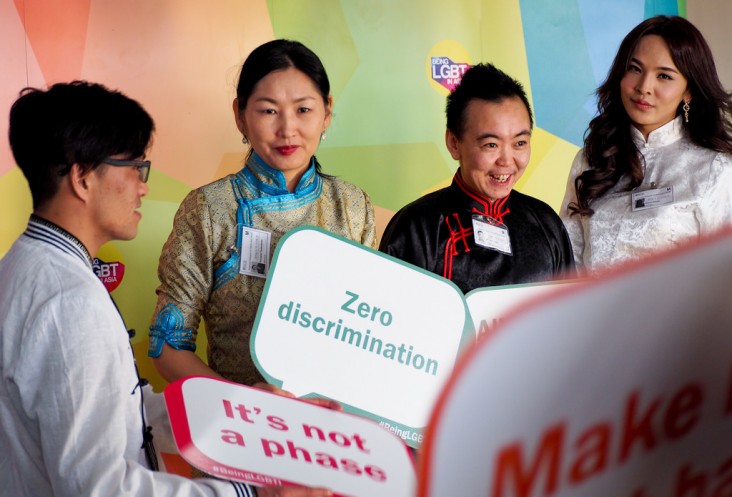
For Immediate Release
BANGKOK, February 27, 2015 – A landmark regional dialogue convened by the United Nations Development Programme (UNDP) with support from the United States Agency for International Development (USAID) and the Embassy of Sweden in Bangkok this week provided a unique platform for advancing rights of lesbian, gay, bisexual, transgender and intersex (LGBTI) people.
"We must continue to bring LGBTI issues to the fore of global development - not only to help change attitudes and introduce LGBTI --affirming policies, laws, and programmes, but also to lift LGBTI persons out of extreme poverty, and give them access to democratic processes and social services that are enjoyed by their fellow citizens and are essential for personal well-being and growth,” said Todd Larson, Senior LGBT Coordinator for USAID.
Some 200 participants from over 30 countries gathered for the three-day Regional Dialogue on LGBTI Human Rights and Health in Asia-Pacific at the United Nations Conference Centre, including civil society, people living with disabilities, government and human rights experts, the private sector, and development partners.
“Equal rights are not special rights. The UN Universal Declaration of Human Rights promised a world that is just and inclusive of all, including LGBTI people,” said Helen Clark, UNDP Administrator, in opening remarks via video from UN Headquarters in New York. “At UNDP we are committed to reducing inequality and ending exclusion.”
Participants reflected on advances achieved in recent years and persistent challenges in regards to LGBTI rights and access to health, education, employment and social protection.
“An active civil society is likely to further the progressive social and legal change that is needed to advance LGBTI peoples’ rights, health and well-being,” said Klas Molin, Swedish Ambassador to Thailand. “All citizens have a right to be treated equally in society, irrespective of their sexual orientation or gender identity.”
“This dialogue presents a great opportunity not only for open discussion but for a country like Bhutan, it is ground breaking. Asian culture and society in general have a very traditional take on issues like this and the discussions we've had are exactly what we need,” noted Karma, a community participant from the Kingdom of Bhutan.
LGBTI people suffer from social stigma and marginalization that is often reinforced through repressive legal and policy frameworks in many countries. These frameworks can cast them as criminals or deviants. The dialogue identified an urgent need to tackle discrimination and remove punitive laws to enable access to health and social services. The rapid and devastating spread of HIV among men who have sex with men and transgender women, particularly in urban areas of Asia and the Pacific, is a stark reminder of the urgency of the situation.
“Far too often, LGBTI people are stigmatized by society and excluded from development opportunities,” said Luc Stevens, UN Resident Coordinator for Thailand. He added, “However, there are positive changes underway in many countries, cities and communities that are enabling people – and increasingly young people – to claim their rights and realize their goals and aspirations.”
The dialogue featured a session on legal gender recognition, which noted progressive advances in India where the courts have clearly articulated the human rights of transgender people as a result of the efforts of communities and allies. In Bangladesh, transgender and hijra communities held their first pride event in November 2014 to mark one year since the legal recognition of hijras as third gender.
“I believe that among our LGBTI family, some of you are ‘intersex’ like me. After living as a transwoman since I was 3 years old, it's time to declare to the world that ‘I'm intersex to transwoman’. The power of self-identification belongs to us and shall not be taken away by the state,” said Nada Chaiyajit from Thailand.
The substantial contingent of civil society participants attending the dialogue were chosen through a voluntary submission and review process to ensure a balanced representation of lived experiences from the diverse sexual orientations and gender identities.
Government experts, academia and the private sector provided informed inputs to compliment the community perspectives. Honourable Oyungerel Tsedevdamba, a Member of Parliament from Mongolia stated “the experiences of stigma and discrimination shared by LGBTI participants have inspired me to call for the introduction of a protective anti-discrimination bill in the Mongolian parliament.”
“We have a right to exist, we are equal human beings and equal citizens,” said the Honourable Louise Wall, Member of Parliament, New Zealand. “Parliaments, political parties and politicians have a significant role in protecting the rights and inclusion of LGBTI people, and to ensure all aspects of those rights are protected in the provision of all goods and services not only by the state but by society as a whole.”
Other issues discussed during the dialogue included the role of advocacy in advancing LGBTI rights and inclusion, addressing the health and employment needs of the LGBTI community, tackling exclusion in education settings and how to create supportive family environments and safe spaces for LGBTI youth. These sessions were also jointly organized with UNESCO, UNICEF, UNAIDS and Out Leadership.
In China up to 50 percent of lesbian and bisexual women have experiences violence in the family,” said Xu Bin from Common Language, a civil society representative from China. “The family should be a place of love and acceptance. Over the past two days, we have shared the importance of engaging with families and support groups such as PFLAG to protect the rights of LGBTI people and families.”
The Dialogue was supported by the Multi-Country South Asia Global Fund HIV programme and the ‘Being LGBT in Asia’ initiative - the first regional UN initiative working directly on LGBTI rights and inclusion. Discussions at the dialogue will help to shape priorities for the initiative, which was launched earlier this week in Bangkok.
See more photos from the Regional Dialogue here: https://flic.kr/s/aHsk5hiWAE







Comment
Make a general inquiry or suggest an improvement.